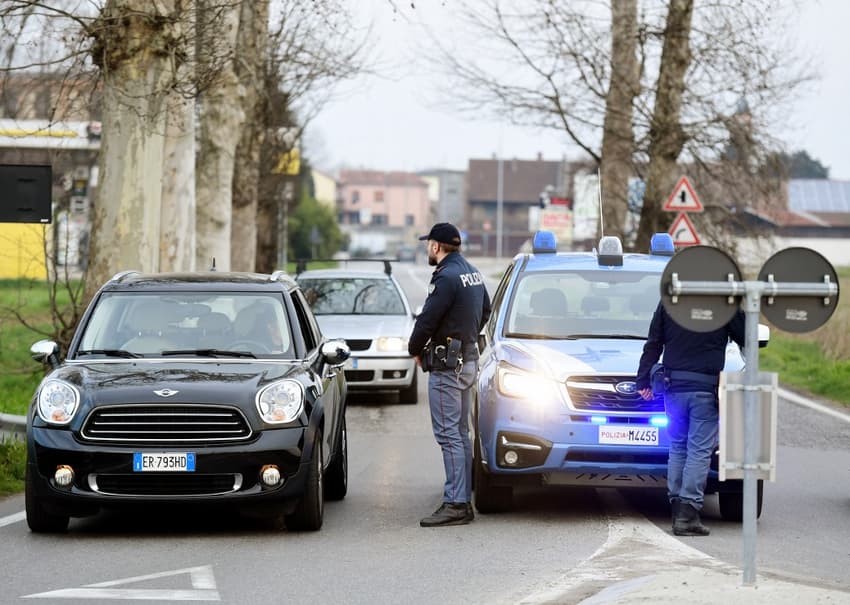Did you know...? Italy can fine you over €3,300 for speeding

Driving in Italy can be an unforgettable experience – but not always for the picturesque views.
Regardless of where you’re headed, driving on Italian roads can often be an unforgettable experience in and of itself as it offers motorists some breathtaking views of the surrounding landscape, from snow-capped mountain peaks to rolling hills and sunny seaside villages.
But taking your eyes off the speedometer and just enjoying the drive can be costly as the Italian Highway Code sets out hefty fines for speeding offences.
Further, Italy is the European country with the highest number of active speed cameras (11.130 devices), which means you’ll likely come across at least one in most of your journeys.
Italy’s Codice della Strada (Highway Code) implements a progressive penalty system, meaning that the higher the excess is the harsher the penalty will be.
Motorists driving over the limit face:
- A fine between €42 and €173 for exceeding the speed limit by up to 10 kilometres
- A fine between €173 and €694 plus a three-licence-point deduction for exceeding the speed limit by 10 to 40 km/h
- A fine between €543 and €2,170, a six-point deduction and a one- to three-month driving ban for exceeding the speed limit by 40 to 60 km/h
- A fine between €845 and €3,382, a ten-point deduction and a six- to 12-month driving ban for exceeding the limit by over 60 km/h
But there’s more.
Fines automatically increase by one third if the speeding offence has been committed between 10pm and 7am.
Speed limits
Article 142 of the Highway Code sets out the following speed limits for standard vehicles:
- 50 km/h in urban centres (though some cities are planning on bringing this down to 30km following Bologna's example)
- 90 km/h for secondary non-urban roads
- 110 km/h for major non-urban roads
- 130 km/h for motorways (though in the presence of certain road features this can be raised to 150 km by local authorities)
These limits can be subject to variations (for instance in the case of adverse weather conditions) and do not apply to ‘special’ vehicles (trucks, farming vehicles, etc.).
Comments (2)
See Also
Regardless of where you’re headed, driving on Italian roads can often be an unforgettable experience in and of itself as it offers motorists some breathtaking views of the surrounding landscape, from snow-capped mountain peaks to rolling hills and sunny seaside villages.
But taking your eyes off the speedometer and just enjoying the drive can be costly as the Italian Highway Code sets out hefty fines for speeding offences.
Further, Italy is the European country with the highest number of active speed cameras (11.130 devices), which means you’ll likely come across at least one in most of your journeys.
Italy’s Codice della Strada (Highway Code) implements a progressive penalty system, meaning that the higher the excess is the harsher the penalty will be.
Motorists driving over the limit face:
- A fine between €42 and €173 for exceeding the speed limit by up to 10 kilometres
- A fine between €173 and €694 plus a three-licence-point deduction for exceeding the speed limit by 10 to 40 km/h
- A fine between €543 and €2,170, a six-point deduction and a one- to three-month driving ban for exceeding the speed limit by 40 to 60 km/h
- A fine between €845 and €3,382, a ten-point deduction and a six- to 12-month driving ban for exceeding the limit by over 60 km/h
But there’s more.
Fines automatically increase by one third if the speeding offence has been committed between 10pm and 7am.
Speed limits
Article 142 of the Highway Code sets out the following speed limits for standard vehicles:
- 50 km/h in urban centres (though some cities are planning on bringing this down to 30km following Bologna's example)
- 90 km/h for secondary non-urban roads
- 110 km/h for major non-urban roads
- 130 km/h for motorways (though in the presence of certain road features this can be raised to 150 km by local authorities)
These limits can be subject to variations (for instance in the case of adverse weather conditions) and do not apply to ‘special’ vehicles (trucks, farming vehicles, etc.).
Join the conversation in our comments section below. Share your own views and experience and if you have a question or suggestion for our journalists then email us at [email protected].
Please keep comments civil, constructive and on topic – and make sure to read our terms of use before getting involved.
Please log in here to leave a comment.